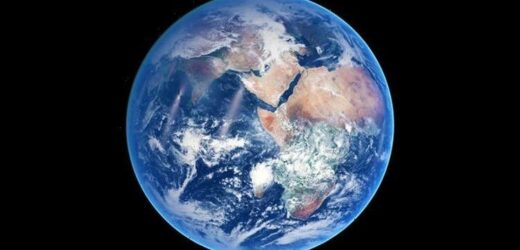Stunning NASA timelapse shows Aurora Borealis from space
We use your sign-up to provide content in ways you’ve consented to and to improve our understanding of you. This may include adverts from us and 3rd parties based on our understanding. You can unsubscribe at any time. More info
Early last year, scientists noted the Earth had begun to spin a bit faster around its axis. After the chaos and turmoil of 2020, the news was likely welcomed by most as it meant the new year would arrive a tad bit sooner than expected. The sped-up rotation continued through the first half of this year but the planet appears to have had a change of heart and is now spinning at a slower rate.
On average, the planet completes a full rotation around its central axis every 86,400 seconds or 24 hours.
In practice, however, each spin can vary in time by fractions of a second, which over time can add to full seconds.
Today, scientists keep track of the time with the aid of atomic clocks, which set the standard for Universal Coordinated Time (UTC).
These ultra-accurate clocks keep a measure of the time by observing the movement of electrons in atoms chilled to absolute zero (−273.15C).


If there is a discrepancy between the time set by the atomic clocks and the Earth’s spin, scientists can add or subtract so-called “leap seconds” to account for the difference.
Astrophysicist Graham Jones told the BBC earlier this year: “Since the system of leap seconds was introduced in 1972, the Earth’s rotation has generally been a bit slow and so far, there have been 27 leap seconds, and they have all been positive.
“In other words, they have all added an extra second to our clocks, enabling the Earth to catch up.”
According to Live Science and data compiled by the National Institute of Standards and Technology (NIST), one such leap second was added to the clock on New Year’s Eve 2016.
On average, scientists have added a leap second to the clocks every 18 months or so.
Michael Collins reflects on Apollo 11 mission in 2019
When the Earth’s spin sped up in 2020, scientists contemplated the possibility of adding a negative leap second to make up the difference.
That year’s shortest day was clocked on July 19 when the planet completed a day a whole 1.4602 milliseconds faster than the 86,400-second average.
But according to a report in Time and Date, the planet has slowed down once again after the average length of day grew between July 1 and September 30 by 0.05 milliseconds more than in 2020.
The Earth is, consequently, spinning slower than it has in the first half of 2021, although the speed is still above average.
Based on the present rate of spin, scientists may need to introduce a negative leap second in about 10 years time.


However, that could change without notice if the planet decides to speed up or slow down without warning.
And the bizarre phenomenon has made it rather hard for scientists trying to model this behaviour in the future.
Nick Stamatakos of the US Naval Observatory told Time and Date: “We’ve tried internally modelling things for the next two or more years.
“But we’ve run into trouble predicting more than six months or one year ahead.”
Scientists are unsure what causes these long-term changes in the Earth’s rotation.
Sometimes they are triggered by powerful earthquakes as they can cause the Earth’s mass to be rearranged.
Scientists also believed the loss of ice in Greenland has contributed to the Earth slowing down as a result of meltwater moving away from the planet’s poles.
According to NASA, shifts in the Earth’s mass can lead to variations of up milliseconds a day.
Richard Gross at NASA’s Jet Propulsion Laboratory explained: “Earth is just like a skater.
“Anything that moves mass closer to the Earth’s axis speeds its rotation up, and moving mass away from the axis slows it down.”
Source: Read Full Article


